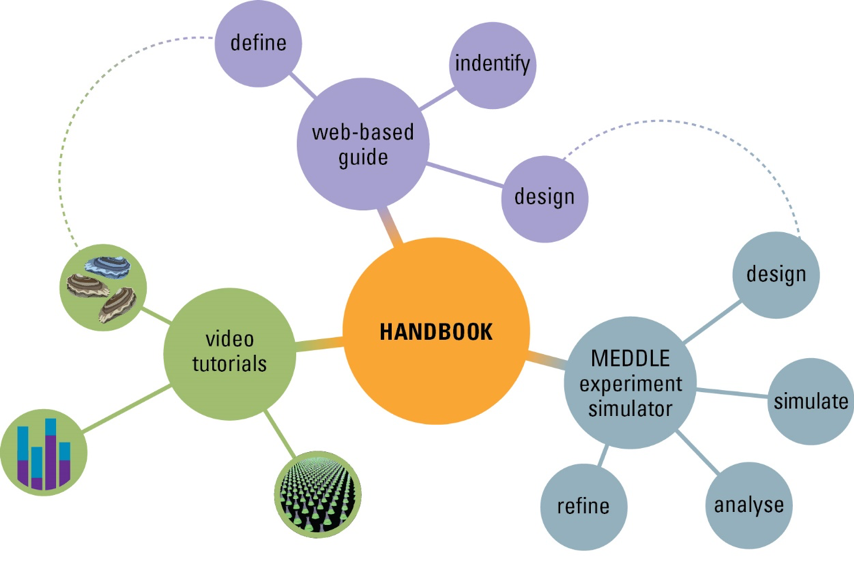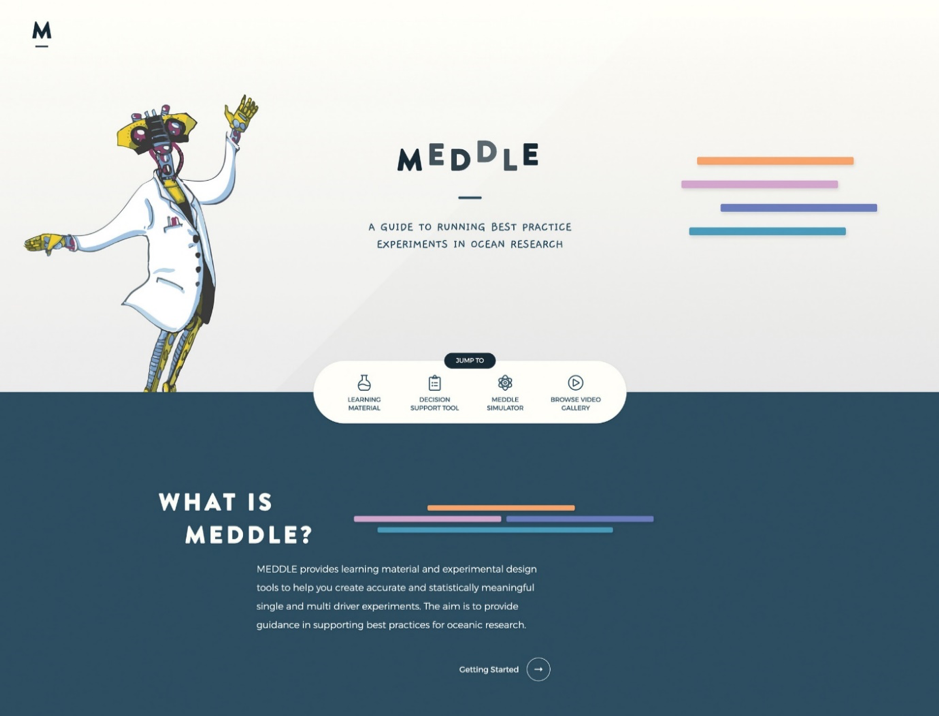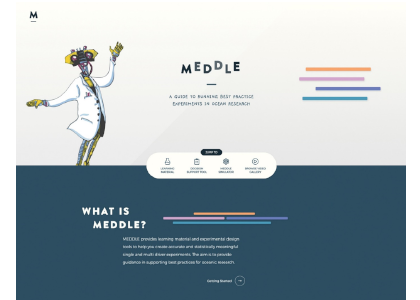Rationale for a web-based Best Practice Guide
WEBSITE www.meddle-scor149.org
The complexity of the natural environment and the number of drivers often prevent the design of a single fully factorial experiment evaluating the impact on a given species or ecosystem. For example, an experimental design to investigate 4 drivers, with 5 treatment levels per driver, and five replicates would require 100 experimental units. To address such complex questions, it is then critical to break them into a suite of simpler experiments. Such simplification requires guidance to ensure that such a strategy follows best practices and have enough statistical power to identify impacts.

There are three strands to the Best Practice Guide: (a) a web-based decision support tool, (b) Multiple Environmental Driver Design Lab for Experiments (MEDDLE) simulation software, and (c) a library of video tutorials. They are linked by a 48 page Handbook.
Download the Handbook (direct link to PDF)
Navigating the Best Practice Guide
The web-based BPG has three distinct components that are linked, with each focussing on a different mode of learning.
The decision support tool is designed to help you get started, and has different entry levels to facilitate giving the right pointers to the newcomer, as well as to those at an intermediate or advanced level.
MEDDLE – Multiple Environmental Driver Design Lab for Experiments – enables you to design and run experiments on a website and hence promotes self-learning and upskilling.
A library of videos enables you to refine your skill-set via a series of topical tutorials by field-leading experts.
Decision Support Tool
The Decision Support tool takes you through a different stage of the planning process:
(1) defining the research question
(2) identifying responses, drivers and the design
(3) finalising the design.
Together they form a series of three iterative loops designed to systematically step you through a series of decisions needed to arrive an experimental design that you can then use in MEDDLE. The three loops also often multiple entry points depending on the users’ level of expertise on this topic.
The Decision Support tool can be filled in on line or each of the loops can be downloaded as a Word document and filled in. It is envisaged that the completed documents can be discussed with supervisors, within lab group meetings or with mentors. The documents can then be further amended, revised and the initial experimental designs refined in preparation for the next strand of the Best Practice Guide – MEDDLE – Multiple Environmental Driver Design Lab for Experiments.
MEDDLE
MEDDLE provides both background learning material and the entry point to the experimental simulator. For the newcomer to multiple driver research this background material can be used to explore the nature of response or affinity curves for different temperatures or for other single drivers such as salinity, or carbon dioxide. Others at more advanced stages may wish to proceed directly to the learning material on multiple drivers. The next step is to become familiar with the simulator where single or multiple driver experiments (such as those featured in Table 1) can be run using a wide range of permutations of treatment levels and replication.
In most cases it is best to commence with a series of single driver experiments to get a handle on the characteristics of each of the drivers within MEDDLE. This mimics the running pilot or preliminary studies which can greatly assist with the step up in logistical, conceptual and analytical skills needed to run multiple driver experiments.
The output file (in csv format) can be readily analysed, and there are some pointers and resources on how to go about data visualisation and statistical analysis. The final step in MEDDLE is Refine – where you can determine if your design is good, adequate (i.e., in need of refinement) or inadequate (in need of major refinement, or re-design).

Video tutorials
The final mode of learning in the www-based BPG is a library of video tutorials which delve into and amplify many of the issues addressed in this Handbook, in the decision support tool, and in the background learning material within MEDDLE.
The tutorials commence with three introductory videos which cover the fundamentals of planning a multiple driver experiment: Driver Inventories, Experimental Design, and Data Analysis. Viewers are then encouraged to advance to more specialised videos including Environmental Realism, Ecology and Evolution, Meta-analyses, and Scenarios vs. mechanisms”





